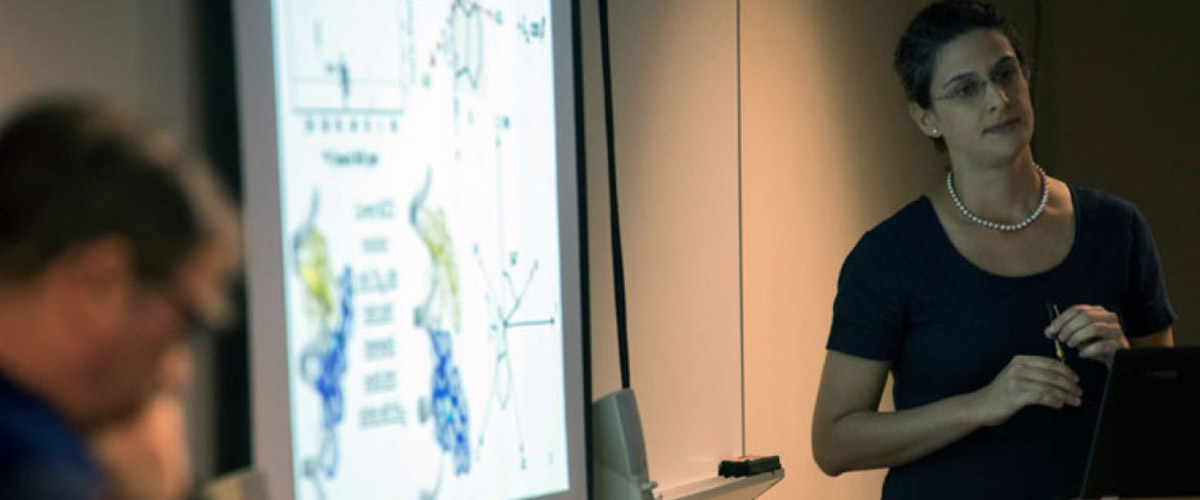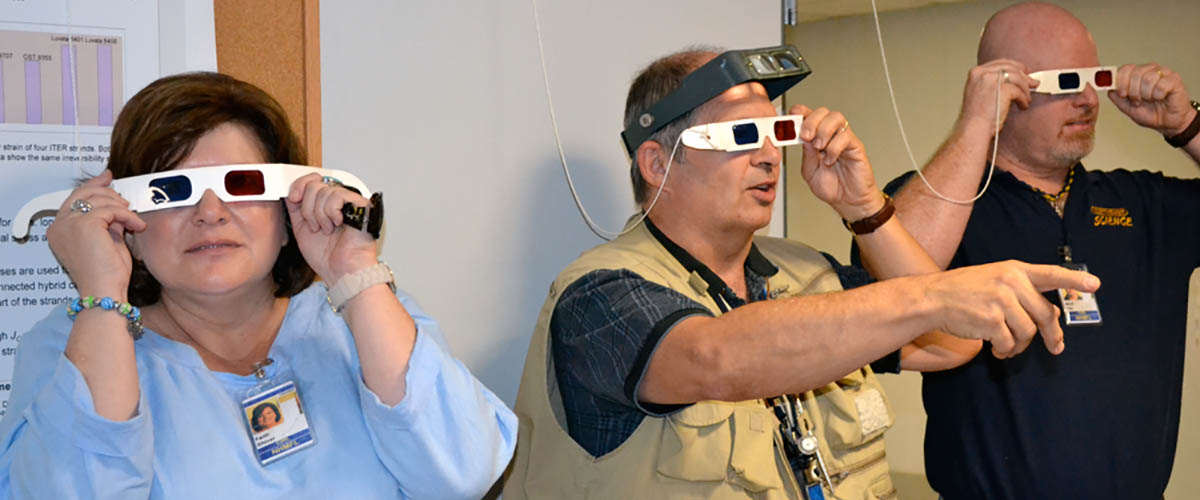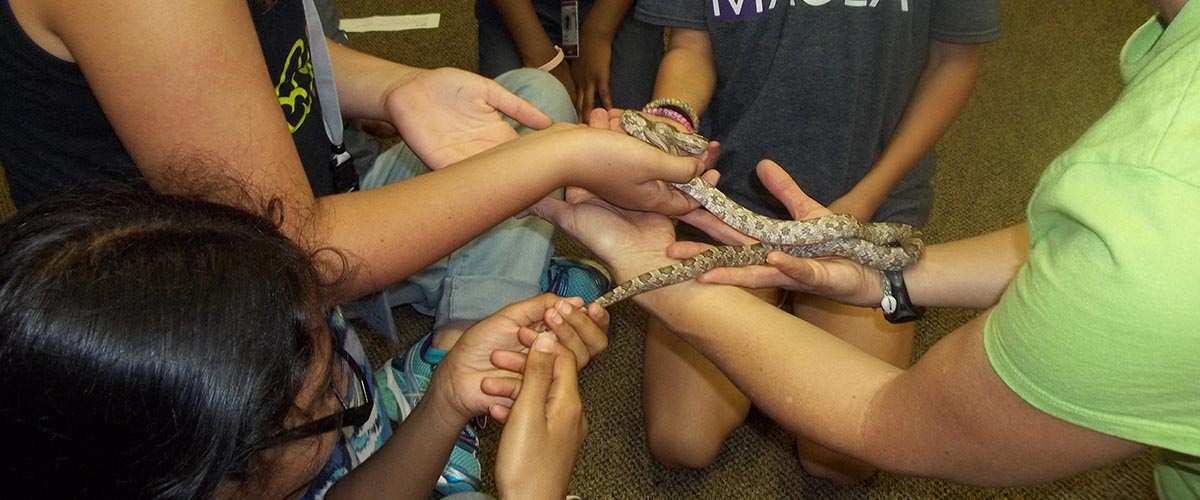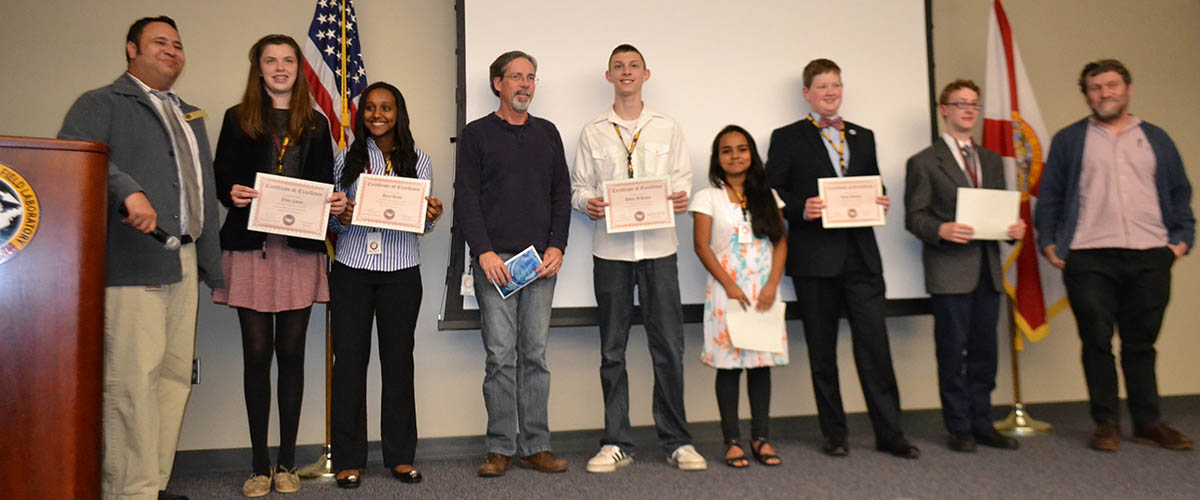In conservative pearls, sensible heels and navy blue dress (the color inspires confidence, she said), Joana Paulino paced purposefully in the darkened room where she was about to defend her Ph.D. thesis.
A graduate student in Florida State University's molecular biophysics program, Paulino had been working toward this moment for six years. Under advisor Tim Cross, who directs the National MagLab's NMR facility in Tallahassee, she had done exhaustive literature reviews, run hundreds of experiments, shaped her data into coherent results and wrote, revised and re-revised a seven-chapter opus entitled "Dynamics of the M2 Proton Channel of Influenza." It had been a long, intense haul.
But now, before an attentive audience, she dropped words like "oligomerization" with nary a stumble and wielded a laser-pointer with regal demeanor, bidding the tiny orange dot to dance over the peaks of her nuclear magnetic resonance (NMR) data.
All in all, she put up a pretty good front.
"I was dying," Paulino later confessed of the 45-minute presentation. "I was quite nervous."
Statistically, there was little reason to worry. It is rare for a Ph.D. student to fail his or her dissertation defense, the final trial standing between them and the right to write "Dr." before their names. For the most part, students who can't successfully research, write and explain their work drop out long before this climactic point.
Cross, who has launched 28 Ph.D.s into the world and knows a thing or two about the process, had tried to reason with her. "I told her, ‘Look, you're the expert in this area now. What do you have to be nervous about?'"
But when it's just you at the podium on one side of the room, and your advisor, dissertation committee and assorted friends and colleagues staring at you from the other, you can feel a little vulnerable. It may be illustrations of tetrameric proton channels and lipid molar fractions up on the screen, but it feels like it's your soul up there, laid bare for all to judge.
"I think it's impossible not to be nervous when you're doing a public presentation on your work, because it's something that is very personal," said Paulino, her words riding the lilt of her native Portuguese. "It's your life. It's not a 9-to-5 job."
Indeed, the many phases of earning a Ph.D. have consumed Paulino's life ever since she came to FSU from Brazil in 2010.
First, working in Cross's group, she needed to find a promising topic. She chose the matrix-2 (M2) protein, located in the outer layer of the influenza A virus. Scientists have long studied that protein, in the search for drugs to combat it. Paulino selected two specific M2 sites to scrutinize: position 27 and position 41.
But when she presented her prospectus, or research plan, to her thesis committee, they asked her to rework parts of it.
In hindsight, it shouldn't have been a surprise, said Paulino. Expressing herself, especially in science, has never come easy. "I was not a great communicator in Portuguese, either," she quipped.
She gave it another shot and did a better job. Years of experimentation, data analysis and interpretation followed. In group meetings, she honed communication skills. Cross taught her correct terminology, to use more formal language and to organize her thoughts in a way that made sense to other people.

Paulino celebrates with cake and champagne after a successful dissertation defense.
Image credit: Dylan Murray.
After a few years, she got the chance to write again — this time a full-fledged dissertation.
Cross gave advice: Start with the conclusions, then work back to the introduction. Still, Paulino struggled. She wrestled with organization. She doubted herself, did analyses and simulations over and over. Of all her years as a graduate student, writing her dissertation was the low point.
"You go back and forth and you question yourself 100 times," she said. "It was terrible."
She plowed through. Cross edited. She revised. After a few months, the ordeal was finally over.
Then, for the official dissertation defense, she had to condense that 150-page manuscript into a 45-minute PowerPoint. She rehearsed the heck out of it, starting with a presentation in front of the Cross research group.
If that presentation had been a Broadway show, it would have been shut down after its debut.
"It was really bad," said Paulino. "I think you need to do something really bad to grow from there."
And with practice, practice, practice, grow, she did. Early on the September morning of her defense, she rehearsed a final time as her boyfriend Dylan Murray watched. Just two years earlier, he had stood in the exact same spot.
"Basically, if you get this far and you don't start speaking complete gibberish, you get through it," said Murray, a former Cross student now doing post-doctoral research at the National Institutes of Health.
Paulino, dropping terms like "2H quadrupolar coupling" and "15N chemical shift anisotropy," may as well have been speaking gibberish, at least to any non-scientists in the audience. But it made perfect sense to her impressed thesis committee who, after suggesting a few improvements, welcomed her to the exclusive Ph.D. club.
Then it was time for cake and champagne. Decked in the Ph.D. regalia he had inherited from his botanist mother, Cross celebrated his newest doctoral success. When a student like Paulino proves him wrong, he reflected, he knows he has succeeded as an advisor.
"To see that student come back into the office just beaming and grinning from ear to ear: That person's self confidence has soared, and it will never come down," said Cross. "That person now knows that they can design an experiment, they can justify the experiment, they can carry it out and they can get novel science that no one has done before.
"Then," added Cross, "they're launched."
By Kristen Coyne






